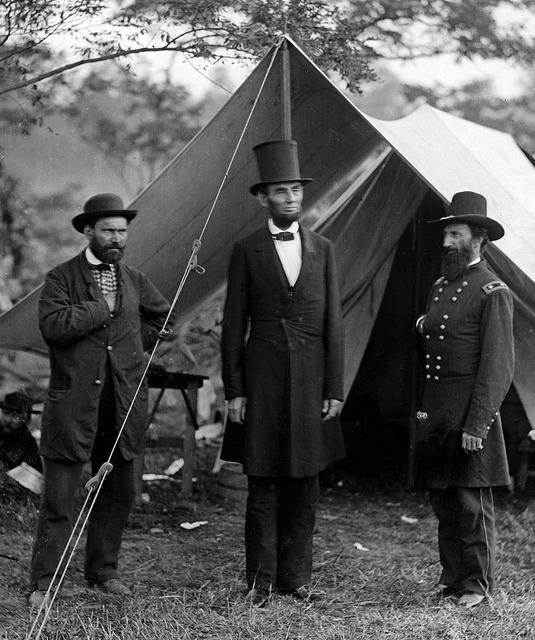 Whether or not Lincoln was truly the “Great Emancipator” remains a staple of discussion in American classrooms. Some believe that Lincoln was the single most important agent in the process of slavery’s destruction and that without his prudent leadership, the peculiar institution might have endured the Civil War and for generations beyond. Others argue that Lincoln was dragged into abolition –that he was a reluctant emancipator– and ultimately peripheral to several other more important agents (such as, most notably, the enslaved people themselves). A few critics even deride Lincoln’s leadership on this issue and on the war in general as disastrous for its high cost in human sacrifices, not only the dead soldiers, but also the many sick and dying southern civilians (including ex-slaves). The documents in this section offer evidence which might allow students to decide for themselves what Lincoln believed about both slavery and race –questions that often get lumped together today but which he tried earnestly to separate.
Whether or not Lincoln was truly the “Great Emancipator” remains a staple of discussion in American classrooms. Some believe that Lincoln was the single most important agent in the process of slavery’s destruction and that without his prudent leadership, the peculiar institution might have endured the Civil War and for generations beyond. Others argue that Lincoln was dragged into abolition –that he was a reluctant emancipator– and ultimately peripheral to several other more important agents (such as, most notably, the enslaved people themselves). A few critics even deride Lincoln’s leadership on this issue and on the war in general as disastrous for its high cost in human sacrifices, not only the dead soldiers, but also the many sick and dying southern civilians (including ex-slaves). The documents in this section offer evidence which might allow students to decide for themselves what Lincoln believed about both slavery and race –questions that often get lumped together today but which he tried earnestly to separate.
Essential Question
Why did Lincoln try to separate some aspects of equality from emancipation?
Featured Documents
- October 3, 1845 –Letter to Williamson Durley (#23)
- June 16, 1858 –House Divided Speech (#6)
- July 22, 1862 –First Draft of Emancipation (#17)
- January 1, 1863 –Emancipation Proclamation (#2)
- April 4, 1864 –Letter to Albert Hodges (#7)
Additional Documents
- March 3, 1837—Slavery Protest (#53)
- September 27, 1841—Letter to Mary Speed (#46)
- October 16, 1854—Peoria Speech (#75)
- August 21, 1858—First Debate with Douglas (#26)
- August 27, 1858—Second Debate with Douglas (#27)
- September 15, 1858—Third Debate with Douglas (#28)
- September 18, 1858—Fourth Debate with Douglas (#29)
- October 7, 1858—Fifth Debate with Douglas (#30)
- October 13, 1858—Sixth Debate with Douglas (#31)
- October 15, 1858—Seventh Debate with Douglas (#32)
- September 16, 1859—Speech at Columbus (#106)
- December 18, 1860—Letter to Henry Raymond (#110)
- September 2, 1861—Letter to John Fremont (#57)
- September 22, 1861—Letter to Orville Browning (#47)
- May 19, 1862—Presidential Proclamation (#65)
- August 14, 1862—Address on Colonization (#66)
- September 13, 1862—Reply to Emancipation Memorial (#49)
- September 22, 1862—Presidential Proclamation (#33)
- September 28, 1862—Letter to Hannibal Hamlin (#85)
- January 14, 1863—Letter to John Dix (#104)
- January 19, 1863—Reply to the Workingmen of Manchester (#114)
- August 5, 1863—Letter to Nathaniel Banks (#145)
- September 2, 1863—Letter to Salmon Chase (#68)
- September 11, 1863—Letter to Andrew Johnson (#119)
- March 13, 1864—Letter to Michael Hahn (#72)
Multi-Media Resources
- Michael Clancy, Principles and Politics, Prezi, Understanding Lincoln, Summer 2014
- Lisa Herzig, Motivation for Emancipation, Weebly, Understanding Lincoln, 2016
- Adam Grant Kelley, Lincoln’s Evolution on Race, Wix, Understanding Lincoln, Fall 2013
- Tamara Korth, Lincoln, the Great Emancipator?, Prezi, Understanding Lincoln, Fall 2013
- Lois MacMillan, Global Lincoln, Wordpress, Understanding Lincoln, Fall 2013
- Michael Normant, Lincoln-Douglas Debates, Prezi, Understanding Lincoln, Fall 2013
- Greg O’Reilly, Lincoln on Inequality, Wix, Understanding Lincoln, Summer 2014
- Lindsay Peterson, Lincoln and Emancipation, Weebly, Understanding Lincoln, 2016
Further Reading
- Eric Foner, “The Emancipation of Abe Lincoln,” New York Times, December 31, 2012, http://www.nytimes.com/2013/01/01/opinion/the-emancipation-of-abe-lincoln.html
- Allen C. Guelzo, “How Abe Lincoln Lost the Black Vote: Lincoln and Emancipation in the African American Mind,”Journal of the Abraham Lincoln Association 25 (Winter 2004), http://hdl.handle.net/2027/spo.2629860.0025.103
- James Oakes, “Natural Rights, Citizenship Rights, State Rights, and Black Rights: Another Look at Lincoln and Race,” History Now 18 (Winter 2008), http://www.gilderlehrman.org/history-by-era/lincoln/essays/natural-rights-citizenship-rights-state-rights-and-black-rights-anothe
- Phillip Shaw Paludan, “Lincoln and Negro Slavery: I Haven’t Got Time for the Pain,” Journal of the Abraham Lincoln Association 27 (Summer 2006), http://hdl.handle.net/2027/spo.2629860.0027.203
